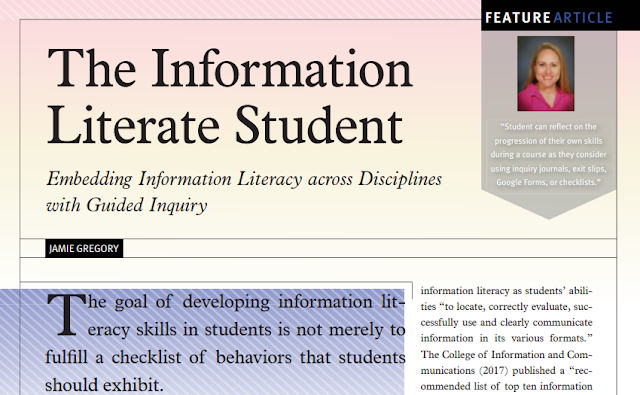Information Literacy Resources - Reading Review Blog Post #3
My initial inquiry into resources related to information literacy led me to an article by Copeland and Jacobs in the journal Teacher Librarian entitled, "The power of collaboration between school librarian and classroom teacher". This article describes a successful collaborative relationship where a teacher librarian and classroom teacher taught students research skills to elementary school students. Copeland and Jacobs write, "the school librarian and teacher planned the unit together, determining student goals related to social studies content, information literacy skills, and communicator/collaborator skills." (Copeland & Jacobs, 2017, p 23). One reason this article is an excellent source is that it lists challenges that teachers may face when considering collaboration and offers possible solutions.
As I'd had success finding articles on my chosen topic of information literacy in the journal Teacher Librarian, I narrowed my search within the LISTA database by typing "teacher librarian" in the publication name field. The resulting search led me to Jamie Gregory's article called, "The information literate student: embedding information literacy across disciplines with guided inquiry". This article lists various types of inquiry projects that pair well with information literacy lessons. I was attracted to this article because it reminded me of a conversation I had with a teacher librarian colleague this week about teaching information literacy skills in a meaningful way. Gregory argues against the status quo where, "many teacher librarians are asked by classroom teachers to provide initial instruction for students on evaluating websites, and this instruction often occurs in isolation rather than in context." (Gregory, 2018, p. 27). She advocates for information literacy instruction that is embedded within an inquiry project as it is more meaningful to the students.
While I was able to find many articles on information literacy, it was more challenging to find Canadian sources. The American standards aren't always relevant, so I searched more deeply until I found School Libraries in Canada. Although the article I chose to highlight (Novice teachers’ perceptions of the role of the teacher-librarian in information literacy by Katherine Miller) is a little dated, it raised some important points that I think are important for me to consider as a new teacher librarian. Miller questions teachers' and administrators' knowledge of the role of teacher librarians and looked into how much training new teachers received in working with teacher librarians. Miller writes, "I believe that new teachers are generally unaware of the collaborative role the teacher-librarian can play in implementing information literacy skills across the curriculum. In addition, novice teachers are not aware of the concept of information literacy. ...are not aware of the teaching and instructional partner component of the role." (Miller, 2005, p. 26) Miller's article reminds me that although I have been busily studying about the role of the teacher-librarian for years, other teachers need reminders about how they can collaborate with a teacher librarian. It will be important for me to advocate for myself and let others know how we can work together.
One of my favourite ways of working with others is sharing exciting new resources I've discovered. A non-fiction series I came across while doing my reading review is Two truths and a lie by Paquette and Thompson. The fascinating aspect of their information books is that they're peppered with outlandish facts and a few untruths and it's up to the students to research the statements further to sort the truths from the lies. Currently, two books in this series have been published, the first on the topic of animals and the second with the subtitle: histories and mysteries. The third book, about forces of nature, is set to be published in summer 2019. Although I haven't seen these books in person yet, I am impressed with the concept and appreciate the fact that the Kirkus review states that, "Sound advice is given on how to seek and evaluate information online". I look forward to reading the books from this series and sharing them with students.
References
Copeland, A., & Jacobs, L.. (2017). The power of collaboration between school librarian and classroom teacher. Teacher Librarian, 45(2), 22–27.
Gregory, J. (2018). The information literate student: embedding information literacy across disciplines with guided inquiry. Teacher Librarian, 45(5), 27–34.
Miller, K. (2005). Novice teachers’ perceptions of the role of the teacher-librarian in information literacy. School Libraries in Canada (17108535), 24(3), 13–36.
Paquette, A.-J., & Thompson, L. A. (2017). Two truths and a lie: It's alive!. New York, NY. Walden Pond Press, an imprint of HarperCollinsPublishers.
Paquette, A.-J., & Thompson, L. A. (2018). Two truths and a lie: Histories and mysteries. New York, NY. Walden Pond Press, an imprint of HarperCollinsPublishers.







Holly, I really appreciated the look of your blog! Clearly not something new for you. I'm going to pick up a copy of the Two Truths and a Lie resource. Perfect age range for my position. I've attached a link that came about from my LLED 469 course around inquiry. It's from 21st Century information fluency website about fact checking. https://21cif.com/rkitp/course/elementaryworkshop/factcheck.html (how do i make this a link?)
ReplyDeleteIt has external links to various sites for students to scrutinize and evaluate.
Thanks, Dianne! Yes, I've been blogging for a decade now and I've learned a lot along the way. I'm hoping to pick up the Two Truths and a Lie book as well, we have some good book sales coming up soon. Thank you for sharing the fact checking website!
DeleteWell done final blog post of your personalized inquiry, reflection on your progress, new change in direction and effective search strategy. These annotated resources look very useful and supportive in your goals. You've done a great job describing and recommending these resources, while also highlighting any challenges or gaps in the knowledge or resource. Your final vetted, selected list looks super good and will support you moving forward in your inquiry based learning and lessons.
ReplyDelete